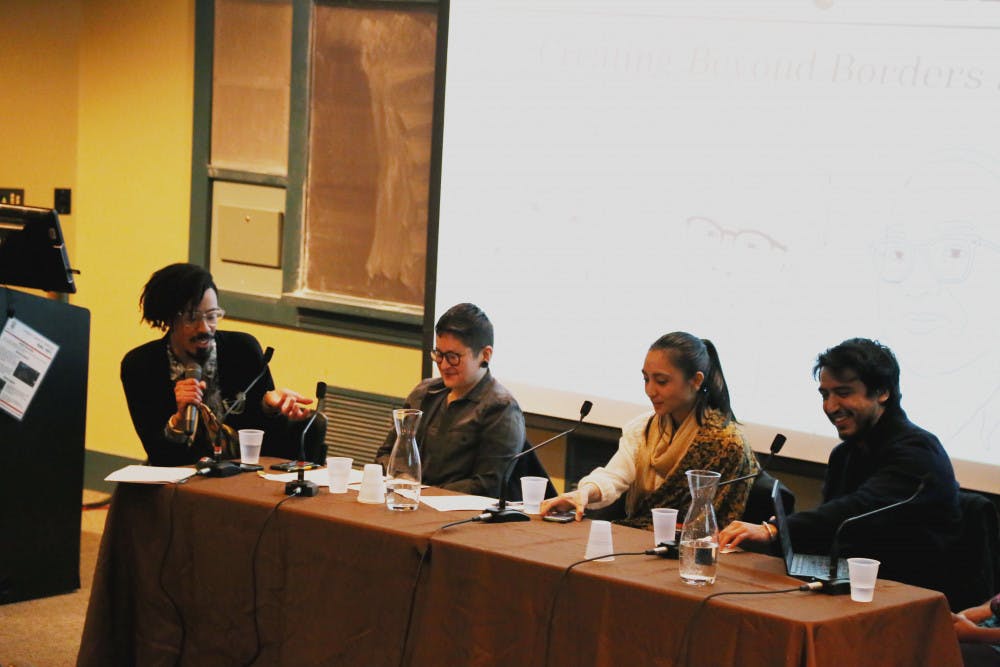“For me, (art) was a way to quiet the demons inside, whether it was rage or anger or feeling lost,” said Rommy Torrico, an undocumented, queer and trans visual artist, during an event hosted by the First-Generation College and Low-Income Student Center and the LGBTQ Center Thursday. “Eventually, creating ended up turning into a way to fight back.”
The program, titled “Undoc-QT ARTivism: Creating Beyond Borders,” allowed students to hear a panel of artists who identify as queer or trans describe their experiences of being undocumented in the United States. The event — which was moderated by Alan Pelaez Lopez, an Afro-indigenous poet — was part of the FLi Center’s Undocumented Student Initiative and the LGBTQ Center’s Queer Legacy Series.
It was important to have a conversation about “the intersection of queer and trans identity, because that’s not a narrative that we hear a lot (about),” said Je-Shawna Wholley, assistant director of the LGBTQ Center.
During the event, artists discussed a wide variety of topics, from the interplay between their gender identities and immigration statuses to the erasure of certain experiences in the media-constructed narrative of immigration issues.
“As an Asian person, I felt erasure in the larger immigration narrative. I was born in the Philippines but raised in the Marshall Islands,” said Soultree, a Filipinx singer, rapper and poet. “There’s very few islander or islander nations that are acknowledged within the larger conversation.”
“I really want to ask the space to think about, ‘What do we see in the media? Which cultures and ethnicities are represented? Whose deportations are being seen as more important?’” they added. “It’s been challenging, and it feels overwhelming to see the amazing support that’s happened because of the targeting of specific communities,” they said, adding “but we have to be critical about who doesn’t have that support.”
The panelists also spoke about how their identities as queer or trans, coupled with their interest in art, influenced their immigration activism. Ola Osaze, a trans Nigerian writer and immigrant, said he was “particularly moved by the ways in which … queer and trans folks back home are criminalized.”
“Many folks are internalizing this narrative of queer and trans Africans being abominations, being un-African,” he said. “This gender binary bullshit … is not our history as black or brown people. … I’m writing for our people to remember that.”
Felipe Baeza, a visual artist, said he often questioned where his art fit into his activism. Art encouraged him to imagine and create worlds that his body would want to exist within, he added. Working with media such as collaging and incorporating physical techniques like “sanding, tearing and pulling apart” allowed Baeza to realize this goal.
Soultree said they use rap to comfort other members in the undocumented community. “I started using rap and singing as a way to travel people out of the conditions we were experiencing,” they said. “Even if I cannot leave the country, my music can,” they added.
The panelists also spoke about the value of retreating in order to engage in effective self-care despite a troubling political climate in the United States. “I need to be well in order for my community to be well,” Osaze said. “Sometimes, you have to retreat to fight another day.”
Despite the challenges presented to undocumented individuals who identify as trans or queer, the artists stressed the beautiful aspects of their identities. “The crux of all these intersections is that you get to meet people with such rich stories,” Torrico said.
“I don’t want anyone to feel sorry for me, and I also don’t want to perpetuate this narrative that we’re oppressed and we’re always crying,” Baeza said. “We’re very much happy and laughing. … We’re trying to live.”
“But I also don’t want to glamorize that being undocumented is great,” he added.
Jonathan Cortez GS said that a “confluence of all different really important issues going on right now” like “immigration, queerness, notions of anti-blackness and anti-indigeneity” brought them to the event.
They added that the event taught them to “be in community with people” and to “look toward the people supporting you for strength, for love and to constantly be questioning our normalized notions” of family, gender, sexuality and documentation.
The event attempted to give students a space to escape the draining nature of American politics, said Julio Reyes ’12, director of the FLi Center. “The current political climate is really terrible, and there’s a lot of violence toward specific communities, … (but) regardless of those moments, there are still spaces for members of those communities to experience joy and what it means to really thrive.”





